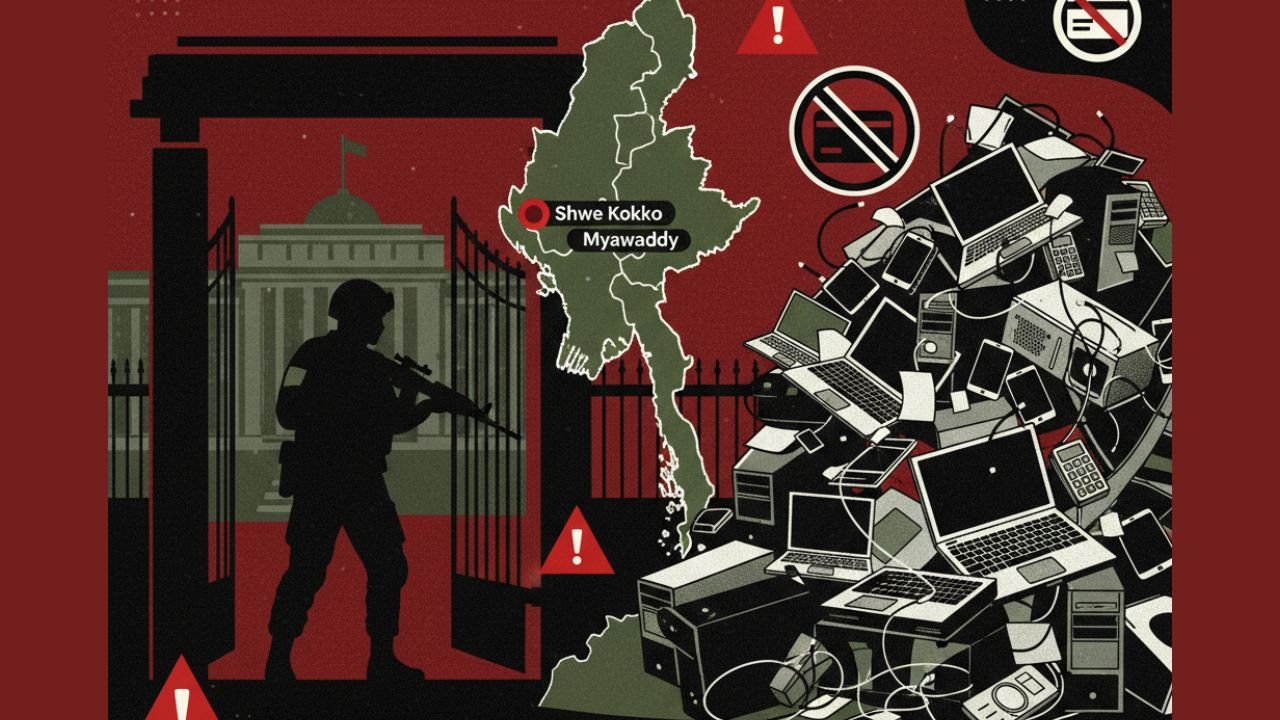Myanmar’s military has carried out a major raid on an online scam hub near the Thai border, detaining close to 350 foreign nationals in one of its most publicised crackdowns on cross-border fraud networks in recent months.
The operation targeted the well-known illegal compound at Shwe Kokko in Myawaddy, a region long associated with gambling, cyber fraud and trafficking. The raid was reported by the state-run Global New Light of Myanmar.
According to the report, security forces moved into the area early Tuesday and detained 346 foreigners found working inside the complex. Officials also seized nearly 10,000 mobile phones, computers and other devices used for running online gambling and scam operations.
Algoritha: The Most Trusted Name in BFSI Investigations and DFIR Services
Links to She Zhijiang and Yatai Group
Authorities said the compound was linked to the Yatai Group, associated with Chinese-Cambodian businessman She Zhijiang, who has been under scrutiny for his role in online gambling and large-scale fraud networks.
She was arrested in Thailand in 2022 and extradited to China last week, where he faces charges connected to illegal online casinos and transnational online fraud. His companies have previously been sanctioned by the United Kingdom and the United States.
Border Regions Turn into Cyber Fraud Corridors
Since the COVID-19 pandemic, border areas between Thailand, Myanmar, Laos and Cambodia have become hubs for cyber fraud. These regions host compounds where thousands of people—many lured with false job offers—are forced to carry out online scams, including investment fraud, romance scams and crypto-related deception.
International estimates suggest these networks have generated billions of dollars, supported by human trafficking routes that continue to expand despite regional enforcement efforts.
Growing Chinese Pressure Behind Crackdown
Observers say Myanmar’s military government has stepped up its actions in response to pressure from China, a key political and economic backer. Beijing has repeatedly raised concerns about Chinese nationals being trafficked into scam compounds in Myanmar’s border zones.
Monitoring groups, however, argue that many of these raids serve a dual purpose: demonstrating cooperation with China while ensuring that the deeper financial networks—linked to militia groups allied with the military—remain largely intact.
Previous Raids and Surge in Arrests
The latest raid follows several similar operations. In October, the military detained more than 2,000 people during a raid on the KK Park compound, another major fraud centre along the Thai border. That operation also led to the seizure of 30 Starlink terminals, which were being used to run cross-border scams with minimal detection.
In September, the United States imposed sanctions on more than 20 companies and individuals in Cambodia and Myanmar for their role in running or enabling such operations.
Impact of Civil War
Since the 2021 military coup, Myanmar’s borderlands have been engulfed in conflict between the army and various ethnic armed groups. The breakdown of law and order has allowed syndicates to expand rapidly, offering protection to fraud centres in exchange for revenue.
Analysts say the combination of weak governance, militia control and high profits has turned the region into one of the world’s most entrenched cyber-fraud ecosystems.
Uncertain Future Despite Major Operation
The detention of nearly 350 people marks a significant headline-grabbing action, but experts caution that the internet fraud industry in Myanmar is deeply rooted and unlikely to collapse after a few raids.
Many of the compounds operate under private militias or business groups that maintain strong ties with political interests on both sides of the border.
For now, Myanmar’s military is projecting the latest arrest sweep as evidence of its commitment to countering online crime. Whether this will lead to consistent enforcement—or simply remain part of a periodic show of cooperation—remains unclear.


